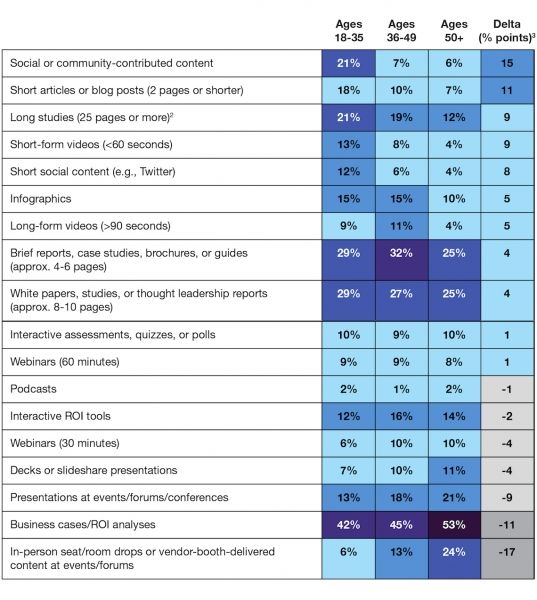



Forrester: B2B firms risk losing 19% of revenue when content marketing misses the mark
share on
B2B firms risk losing 19% of their annual revenue when Millennials (ages 18 to 35) find their marketing content useless. According to Forrester, this means that a theoretical US$10 billion company can risk losing US$1.9 billion of revenue as a result of their content marketing messages, format choices, and spend missing the mark.
In a recent Forrester Infographic titled “Elevate content to engage Millennial buyers based on their preferences”, 57% of Millennials say much of the content marketing material they receive from B2B firms is useless. Majority of them (69%) also say the material from B2B firms is extraneous and they obtain most of their information from other sources. Meanwhile, 65% say too much material is provided by vendors, and they receive content which they did not opt in to receive. Forrester surveyed individuals from Asia Pacific (30%), Europe (42%), and North America (28%) about their content preferences.
More than a third of (33%) global technology buying decision makers are Millennials, and 73% of Millennials have a say in purchasing decisions for their companies. To attract this segment, Forrester said brands need to look at doing short-form content (12%), videos (13%), and social or community-contributed content (21%). Millennials also like business cases or ROI analyses (42%), as well as white papers and thought leadership pieces (42%).

In a statement to Marketing, Reggie Lau, director of content marketing consulting for Forrester in Asia Pacific said the expectations of B2B buyers have grown tremendously in recent years. Not only do they retain the characteristics of the traditional B2B buyer (eg. pragmatic, logical, and results driven), but the idiosyncrasies of their consumer nature (eg. emotional) are increasingly coming to the fore, even in business decision-making.
As such, there needs to be a fine balance of credible, substantiated insights, such as those that are data or research-backed, and emotion. To create empathetic content in the B2B space, Lau said brands need to understand their customers, impart insights, embrace emotion and humanise the buyer’s journey.
“It’s not just the content that has to be humanised but the whole brand too. If you want customers to connect with your brand, they first need to feel something about it,” he said. Lau explained:
Identify the specific emotions you want customers to associate with your brand, and follow that through in your marketing communications and all other touchpoints.
He added that ensuring a brand’s content is relatable starts with understanding consumers, what their pain points or needs are, and tailoring the content to answer those concerns.
Millennials not shying away from long-form content
While short-form content appeal to Millennials more than to other age groups, Lau said this does not mean that they are shying away from long-form content. In fact, Millennials and buyers in general are looking for substance over style, with 64% of Millennial Asia Pacific buyers finding that the marketing materials they receive are more focused on style than substance, Lau said.
“To craft an effective marketing campaign, B2B marketers will need various formats of content in their arsenal. Short form content – that is much more visual – is good for attracting views and attention, but you need to be able to back it up with concrete research too,” he explained.
That said, B2B firms in Asia Pacific engage with buyers very similarly to their global counterparts. According to Lau, part of this is a propensity for Asia pacific to take the cue from the US and Western European practices. Another is due to the larger US and Western European companies that have set up strong Asia Pacific offices but still relying on their headquarters to provide the overall marketing strategy and content.
“In general, locally grown brands and MNCs will develop content in their local/native language, whereas global MNC’s will either only localise US/Western Europe content or develop local content with English in mind first, and translations thereafter,” Lau explained.
Ways for B2B firms to engage Millennials
Millennials prefer to hear from vendors directly. According to Forrester, 53% of Millennial respondents found it valuable to hear directly from vendors when making a technology purchase decision. The vendors should also understand their business and industry (86%), customise ROI analysis content to the respective firms (81%), and understand what is most important to the buyers’ jobs (80%).
Additionally, it is important for vendors to have a compelling vision to share. Majority of Millennials said when considering technology vendors, it is important for them to share the same vision for what success looks like (81%) and have a unique or distinct point of view on the future of their market (81%). The material provided should also help Millennial buyers form a vision for solving their business problems (78%).
Most of all, Millennials buyers also want to hear from other buyers like them. About 83% of them find it crucial that vendors have a credible and authentic story to tell about how they were able to help customers succeed. Meanwhile, 83% also find it important for vendors to have customers who advocate for them authentically, and 80% turn to peers, colleagues or customer references to be a valuable source of content.
share on
Free newsletter
Get the daily lowdown on Asia's top marketing stories.
We break down the big and messy topics of the day so you're updated on the most important developments in Asia's marketing development – for free.
subscribe now open in new window
